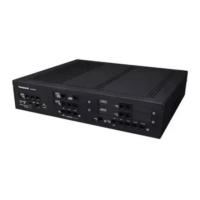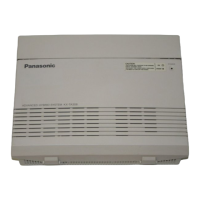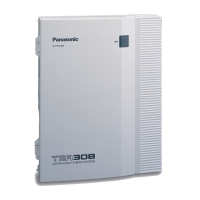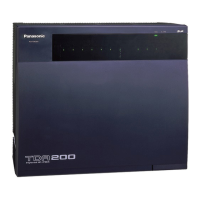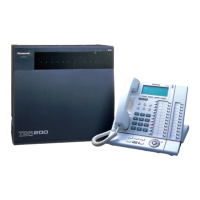Do you have a question about the Panasonic NS1000 and is the answer not in the manual?
Introduces the NS1000 material and lists session topics.
Details items in the box and identifies external/internal components.
Guides on installing optional cards, emphasizing safety precautions.
Explains rack and desk mounting methods for the NS1000 system.
Covers essential grounding, surge protection, and power connection guidelines.
Details connecting peripherals and options to the NS1000 unit.
Outlines steps to initialize the system to factory default settings.
Lists PC requirements and browser settings for Web Console access.
Explains how to connect a PC to the NS1000 via the Web Maintenance Console.
Covers the first login using default credentials and initiating the setup wizard.
Guides through essential system setup steps including location, PBX, LAN, and registration settings.
Details setting the unit as a slave and configuring its IP address and LAN settings.
Explains how to add and register a slave system within the master system network.
Describes UPS integration, conditions, and setting the shutdown threshold.
Provides an overview of the Web Maintenance Console and its structure.
Explains interactive/batch modes and different user account levels.
Details system requirements, available connections, and accessing the WebMC.
Covers login/logout procedures and describes main screens and buttons.
Details descriptions of various screens and buttons within the WebMC interface.
Illustrates an example of setting up Static NAT for network configuration.
Explains the three methods for IP terminal registration.
Covers DHCP settings, Full Automatic, and PBX configuration for UT/NT series.
Details Extension Number Mode overview and PBX configuration for NT series.
Guides through manual registration and PBX configuration for UT series terminals.
Covers manual registration and PBX configuration for NT series terminals.
Explains the installation process for DECT CS units using the UPCMC tool.
Details registration and de-registration for other terminal types.
Explains profile settings for PBX management on a user level.
Describes the default installer profile and how to customize administrator access.
Guides through the process of creating new user profiles using the Add User Wizard.
Details the specific settings and permissions for User, Administrator, and Installer profiles.
Explains the role of DSP resources and the capacity provided by DSP cards.
Details the required DSP resources for various services and call scenarios.
Guides on using the advisor tool and reserving DSP resources for specific services.
Explains how to view and interpret DSP usage trends over time.
Introduces private networking methods: One-Look and QSIG.
Explains the core concept, master/slave units, and features of One-Look Networking.
Details IP trunk and extension capacity limits in networked systems.
Covers P2P communication, benefits, and group settings for IP extensions.
Provides an overview of QSIG connections between different PBX systems.
Details bandwidth calculation for voice data, signaling, and site planning.
Explains firewall configuration for VoIP packets and lists default port numbers.
Covers upgradable firmware, version checks, download, and upgrade processes.
Guides on backing up system data to USB/PC and restoring it.
Explains OGM file upload, recording, and playback procedures.
Details status, upload, deletion, backup, and assignment of MOH/BGM files.
Covers UPS connection, system shutdown (manual/UPS), reset, and fax card restart.
Explains manual and scheduled backup, and restoring UM data.
Details system alarms, SNMP agent settings, SYSLOG, SMDR, CTI, and PT alarms.
Covers SMTP client settings, email notifications, log files, testing, and reports.
Explains the use of the Export/Import tool for data transfer using CSV files.
Describes how to find extension names/numbers using the Extension List View Tool.
Covers IP-address information, port settings, and network diagnostics.
Explains how to read error codes and display system error information via Web MC.
Lists MIB objects for SNMP manager analysis of system information.
Provides a table of tested USB models and their capacities.
| Unified Messaging | Yes |
|---|---|
| SIP Trunks | Yes |
| VoIP Support | Yes |
| Networking | Supports IP networking |
| Compatibility | SIP Phones |
| Power Supply | AC 100-240 V, 50/60 Hz |
| Type | IP-PBX |
| Mobility | Supports mobile integration |
| Voice Mail | Yes |
| Call Center Features | reporting |




